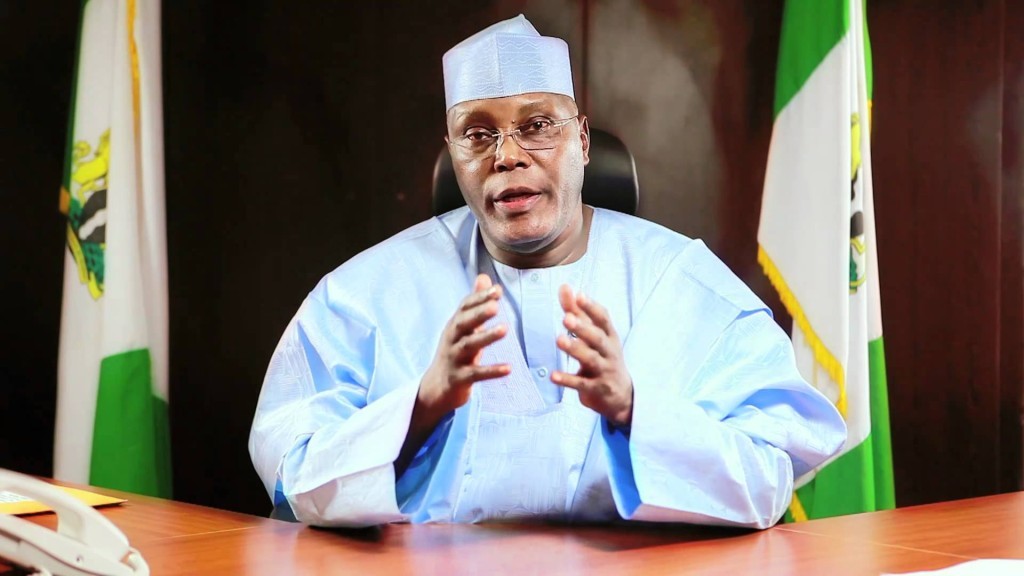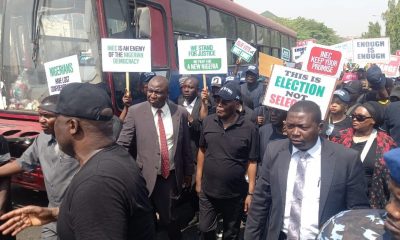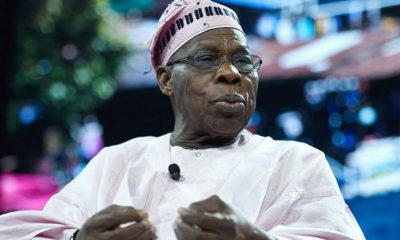General
Unemployment: Atiku Suggests Payment of N5000 Stipend

By Dipo Olowookere
Former Vice President Atiku Abubakar has advised the federal government led by President Muhammadu Buhari to consider paying a N5000 stipend to every family in Nigeria.
However, he emphasised that the beneficiary family must be the one with at least one school-age child and earning less than $800 (N328,000 at I&E rate of N410/$1) per annum.
In a statement issued by the media team of Mr Atiku over the weekend, it was suggested that the N5,000 stipend should be paid by the government to the families “via their BVN and NIN on the condition that they verifiably keep their children in school.”
The former Vice President noted that if this is done, as he earlier advised last year, the country would be solving the twin issue of youth unemployment and a high rate of out of school children, which currently stands at 13.5 million.
“If we do not do this, then the floodgates of unemployment will be further opened next year, and in the years to come,” he warned.
Mr Atiku further stressed that the unemployment rate, which the National Bureau of Statistics (NBS) recently put at 33 per cent, is the root cause of the “unprecedented insecurity Nigeria is facing.”
“Idleness is the worst feature of unemployment because it channels the energy of our youth away from production, and towards destruction, and that is why Nigeria is now the third most terrorized nation on earth,” he noted.
But he said “the fastest way to bring down a world record unemployment rate is via incentivised education. An educated citizenry is more employable and more self-employable.”
“Increased education has been scientifically linked with lower rates of crime and insecurity, along with lower infant and maternal mortality, and a higher lifetime income.
“We must then incorporate those youth who are above school age into a massive public works programme.
“There was talk of 774,000 Special Public Works jobs for the youth, which was to have started in January of 2021. This is a commendable step, but it must be done with proper agenda, rather than propaganda,” he submitted.
Policy already exists
Business Post recalled that in the build-up to the 2015 general elections in Nigeria, the ruling All Progressives Congress (APC), then an opposition party, promised to pay N5,000 monthly to poor Nigerians. This was hailed by many and caused the party to be massively voted for by the electorates.
A year after it gained power, the administration of Mr Buhari announced that N65 billion has been approved for the payment of N5,000 monthly stipend to Nigerians under the Conditional Cash Transfer scheme of the National Social Investment Programme of the government.
The Minister of Finance, Budget and National Planning, Mrs Zainab Ahmed, who was then the Minister of State for Budget and National Planning, had said after a Federal Executive Council (FEC) meeting that the N65 billion was part of the N150 billion approved by the steering committee of the programme.
“Focus has been given to the extremely poor and vulnerable in our society and special emphasis is being placed to providing as many as possible in the North-Eastern part of the country where a lot of Internally Displaced Persons (IDPs),” she had informed reporters then.
Refinery rehabilitation
While commenting on the proposed plans by the central government to rehabilitate the Port Harcourt refinery with $1.5 billion, the candidate of the opposition Peoples Democratic Party (PDP) in the 2019 presidential election described it as unnecessary and “ill-advised” because the facility has “failed to turn a profit for years” despite the huge funds sunk into it for turnaround maintenance.
He maintained that, “As a nation, we are better off privatising our refineries and the NNPC (Nigerian National Petroleum Corporation) through the time-tested LNG model in which the FG owns 49 per cent equity and the private sector 51 per cent.”
“Recall that in 20 years ending 2020, the NLNG had delivered $18.3 billion dividends to government irrespective of taxes and other benefit accruals to the country.
“This will not only free the government of needless spending but also clean up the infrastructure mess in the petroleum downstream sector,” he said.
General
Deep Blue Project: Mobereola Seeks Air Force Support

By Adedapo Adesanya
The Director General of the Nigerian Maritime Administration and Safety Agency (NIMASA), Mr Dayo Mobereola, is seeking enhanced cooperation between the agency and the Nigerian Air Force (NAF) with the aim of strengthening tactical air support within the Deep Blue project.
During a courtesy visit last week, Mr Mobereola told the Chief of Air Staff, Air Marshall S. K. Aneke at the NAF Headquarters in Abuja, that the Air Force was a strategic partner in enhancing maritime security in Nigeria and sustaining the momentum of the Deep Blue Project’s success.
According to the DG, “We are here to seek the Air Force’s support, given the importance of tactical air surveillance to the Deep Blue Project. Nigeria is the only African country with a record of zero piracy within the last 4 years. The Deep Blue Project platforms have been used to achieve zero piracy and sea robberies in the Gulf of Guinea, and we need your collaboration to sustain this momentum”.
He further emphasised that international trade depends on security, which is why vessels prefer to go to or transit through countries where they are secured. “With the traffic we have now, we need to show more security might through collaboration to strengthen our trade viability because of the risks attached to our route. We need these collaborations to sustain what we have achieved so far with the Deep Blue Project”.
The NIMASA DG expressed hope that the collaboration with the Nigeria Air Force will reduce response time.
On his part, the Chief of Air Staff, Air Marshall S.K. Aneke, noted that the Air Force desires to be “a very supportive and collaborative partner with NIMASA and is ready to match the Agency step by step and side by side to achieve the desired results.”
He noted that “collaboration between NIMASA and the Nigerian Air Force under the Deep Blue Project can be strengthened through a joint strategic framework, integrated command structures, and a standing steering committee to ensure shared objectives and accountability.
“Establishing a joint maritime domain awareness fusion cell will enable real-time intelligence sharing, synchronised surveillance, and faster response to maritime threats and ensure sustained operational effectiveness across Nigeria’s territorial waters and exclusive economic zone,” he said, according to a statement.
The Air Force Chief added that the Air Force can also support NIMASA outside the Deep Blue Project operations by providing its own ISR platforms, tactical air support, and rapid airborne deployment for interdictions and search and rescue missions.
While thanking the NIMASA DG for the basic trainings the Agency has provided the aircraft pilots under the Deep Blue Project, Air Marshall Aneke also highlighted areas of operational challenges needing NIMASA’s attention to include bridging the communication gap between NAF operators and NIMASA, higher level and in-depth maintenance trainings, readily available fueling of aircrafts to avoid delays on missions, and provision of flying kits among others.
He therefore pledged the Air Force’s collaboration and assured that the request by NIMASA has been noted and that things will begin to move at thrice its speed going forward.
General
Nigeria’s Democracy Suffocating Under Tinubu—Atiku

By Modupe Gbadeyanka
Former Vice President, Mr Atiku Abubakar, has lambasted the administration of President Bola Tinubu for the turnout at the FCT Area Council elections held last Saturday.
In a statement signed by his Media Office, the Adamawa-born politician claimed that the health of Nigeria’s democracy under the current administration was under threat.
According to him, “When citizens lose faith that their votes matter, democracy begins to die. What we are witnessing is not mere voter apathy. It is a direct consequence of an administration that governs with a chokehold on pluralism. Democracy in Nigeria is being suffocated slowly, steadily, and dangerously.”
He warned that the steady erosion of participatory governance, if left unchecked, could inflict irreversible damage on the democratic fabric painstakingly built over decades.
“A democracy without vibrant opposition, without free political competition, and without public confidence is democracy in name only. If this chokehold is not released, history will record this era as the period when our hard-won freedoms were traded for fear and conformity,” he stressed.
Mr Atiku said the turnout for the poll was below 20 per cent, with the Abuja Municipal Area Council (AMAC) recording 7.8 per cent.
He noted that such civic participation in the nation’s capital, the symbolic heartbeat of the federation, is not accidental, as it is the predictable outcome of a political environment poisoned by intolerance, intimidation, and the systematic weakening of opposition voices.
The presidential candidate of the People’s Democratic Party (PDP) in the 2023 general elections stated that the ruling All Progressives Congress (APC) under Mr Tinubu has pursued a deliberate policy of shrinking democratic space, harassing dissenters, coercing defectors, and fostering a climate where alternative political viewpoints are treated as threats rather than contributions to national development.
He called on opposition parties and democratic forces across the country to urgently close ranks and forge a united front, declaring, “This is no longer about party lines; it is about preserving the Republic. The time to stand together to rescue and rebuild Nigeria is now.”
General
Nigeria Eyes Full Entry into Council of Palm Oil Producing Countries

By Adedapo Adesanya
Nigeria is set to validate a technical committee report geared towards transitioning the country from observer status to full membership of the Council of Palm Oil Producing Countries (CPOPC) in April.
Mr Abubakar Kyari, Minister of Agriculture and Food Security, said this when the council’s mission visited him over the weekend in Abuja, noting that the ministry had constituted a technical committee to consider how the country would seamlessly transit from observer country to membership in CPOPC based on its strategic importance in palm oil production.
“We are conscious of the fact that the palm oil value chain is very strategic for us and identified it as an export crop that can drive foreign exchange for the country and ensure good health in terms of consumption.
“We are conscious of the fact that we need the support of CPOPC countries to provide the country with a new variety of seeds that are climate-smart and resistant so that they can be produced by farmers in the country,” he said.
Mr Alphonsus Inyang, President, National Palm Produce Association of Nigeria (NPPAN), said being a member of CPOPC Nigeria would target over 10 million tonnes of oil palm between 2026 and 2050.
“We are also targeting 2.5 million hectares from among Nigeria households who are out to produce one hectare each, geared towards a N20 trillion annual economy within this period from among Nigeria households.
“We are working side by side with the big players who will be developing plantations,” he said.
The Secretary-General of CPOPC, Ms Izzana Salleh, said the council’s mission to Nigeria was to see how the country could transit from observer status to full membership, among others
She said that the status of the country as an observer nation since 2024 would expire by November.
Ms Salleh assured the country of the council’s readiness to support its vision to strengthen domestic production, enhance food security and build a competitive and sustainable palm oil supply chain.
The official emphasised that being a member of the council would strategically position Nigeria for a greater future regarding oil palm production.
According to her, the visit is to strengthen the council’s engagement with Nigeria, including potential membership in CPOPC.
She said: “The council’s mission to Nigeria aims to advance both Nigeria’s national ambitions and Africa’s collective voice in global agricultural discussions.
“CPOPC was established to promote cooperation among producing nations, empower smallholders, advance sustainability, and ensure fair, science-based global dialogue on vegetable oils.
She emphasised that being a member of the council would strategically position the country for greater future prospects regarding oil palm production and the value chain, as well as export.
“We are ready to support Nigeria’s vision to strengthen domestic production, enhance food security, and build a competitive and sustainable palm oil supply chain,” she said.
-

 Feature/OPED6 years ago
Feature/OPED6 years agoDavos was Different this year
-
Travel/Tourism10 years ago
Lagos Seals Western Lodge Hotel In Ikorodu
-

 Showbiz3 years ago
Showbiz3 years agoEstranged Lover Releases Videos of Empress Njamah Bathing
-

 Banking8 years ago
Banking8 years agoSort Codes of GTBank Branches in Nigeria
-

 Economy3 years ago
Economy3 years agoSubsidy Removal: CNG at N130 Per Litre Cheaper Than Petrol—IPMAN
-

 Banking3 years ago
Banking3 years agoSort Codes of UBA Branches in Nigeria
-

 Banking3 years ago
Banking3 years agoFirst Bank Announces Planned Downtime
-

 Sports3 years ago
Sports3 years agoHighest Paid Nigerian Footballer – How Much Do Nigerian Footballers Earn



















